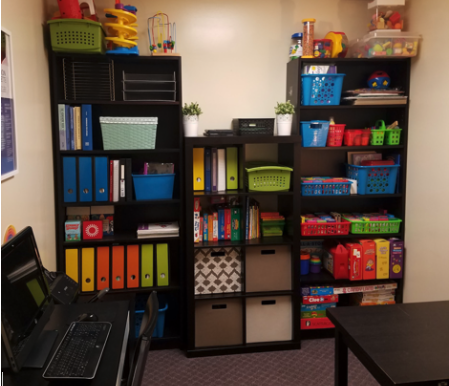Understanding IEP Goals
Kristin Park, MS CCC-SLP A while ago, I wrote a blog post about

Speech and Hearing Health Blog
By: admin | February 14, 2020
Kristin Park, MS CCC-SLP
It is very normal to have tons of questions when your child first qualifies for speech therapy services. The paperwork, scheduling, and evaluation process alone can be enough to overwhelm parents. Often, more questions come to mind long after the intake session has ended. Below is some information to answer some of the more frequently asked questions regarding speech therapy at Premiere Speech and Hearing
A certified, licensed, and credentialed Speech-Language Pathologist will deliver speech and language therapy services. You can check out our staff any time on our website under the “About → Our Staff” tab.
Therapy takes place in our office. Beyond our waiting room, we have private therapy rooms equipped with toys and materials for speech therapy sessions.
Many factors determine how often your child will have speech therapy sessions including:
Generally speaking, children at Premiere Speech and Hearing receive speech therapy anywhere between twice a month to twice a week.
At Premiere, sessions are generally 30 minutes at a time, with some exceptions. Exceptions may include times when a child is not feeling well and needs to end the session early, or perhaps not tolerating therapy on a particularly difficult day. Through our years of experience working with children, we have found that 30 minutes is the ideal length for a speech therapy session. This provides sufficient time for teaching and practicing skills, while also ensuring adequate attention and participation from the child
Children will typically receive speech therapy in the following ways:
This is addressed on a case-by-case basis in our office. Most of the time, parents can observe a session here and there to watch, learn and use the strategies your child is being taught in the session. Depending on the age of the child, sessions are often conducted with just the child and the therapist in the room. This tends to minimize distractions and allow the therapist to fully immerse the child in the therapeutic process. We encourage all parents to talk to your child’s SLP to find out how you can be involved in your child’s sessions.
Your child’s SLP will determine goals for your child’s speech and language needs. You, as parents, will have an opportunity to discuss these goals and agree to a plan of treatment. Goals are based on many factors including:
Expected time frames for mastery of goals depends on the child’s specific needs, but generally they are written in intervals of 3, 6, or 12 months. This may differ from other speech therapy settings. For example, in the school setting, goals are written as part of the Individualized Education Plan and are written for yearly intervals.
This will depend on the therapist your child works with. Usually, progress summaries can be written every 3 to 6 months or so. At this point, goals can be added, modified, or discontinued based on the progress. For some insurance plans, progress reports need to be written every X number of sessions in order to be approved for additional sessions.
Like everything else, the sessions themselves will look different depending on all the variables already discussed. However, here are some basic things you may see in a session:
Most of the time, there will be some kind of homework/home practice for either your child or for you. Especially for younger children, it is critical for parents and family to be involved in the home practice. Your child’s success is very dependent upon the adults in their life helping them learn and use language. For older children, there most likely will be some kind of home practice on a weekly basis. Home practice is very important for your child’s progress!
This is another answer that depends on all the variables already discussed. There is not a universal therapy schedule or duration. All children learn at different paces. Not all speech or language disorders can be corrected at the same pace. In general, speech therapy is not a “quick fix”. Our goal at Premiere is to identify the child’s needs, teach new skills, and ensure generalization of skills across all communication settings in a child’s life. We aim to make lifelong changes. As a frame of reference, mild speech/language issues may be resolved in 6-12 months, whereas children with more severe disabilities may need therapy for several years.
Sources
Yen, K. (2013, July 3). Retrieved from http://www.playingwithwords365.com/what-you-can-expect-from-speech-therapy-a-guide-for-parents-part-five-the-ins-and-outs-of-speech-therapy/

Kristin Park, MS CCC-SLP A while ago, I wrote a blog post about
By: admin | January 19, 2022
